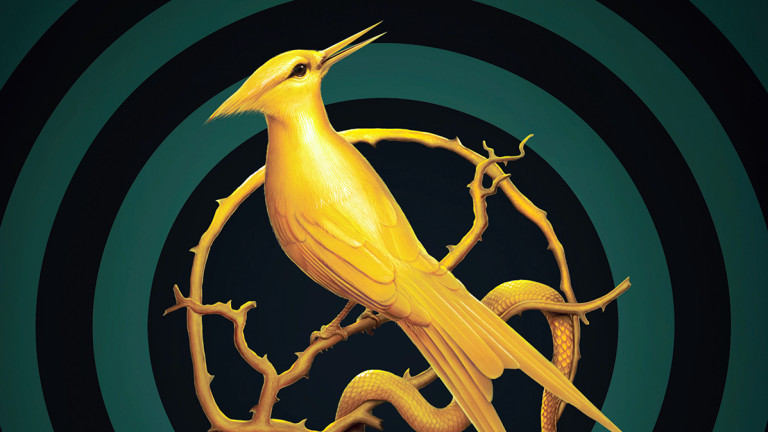Amelie Lee ’23
Copy Editor
(Warning: spoilers for “The Ballad of Songbirds and Snakes” ahead)
In the weeks leading up to spring break, my friend Anna and I rewatched the entire “The Hunger Games” series, hoping to revisit the action and dramatic love triangle of our pre-teen years. Ten years after our first reading of the books, we soon realized that the young-adult series still resonated with us, with the brutality of sending teens to their deaths as political punishment hitting a lot harder when I wasn’t focused on finding content for 2010 #Everlark fanfiction.
When I found out that Suzanne Collins was writing a prequel based on the teen years of President Snow, I was excited to continue to analyze and expand the world of Panem through the lens of a familiar character, and I eagerly read “The Ballad of Songbirds and Snakes” when it was released. Unfortunately, Collins’ explanation behind Coriolanus Snow’s journey to sociopathic tyranny completely fell flat in comparison to the depth of the original trilogy.
What makes “The Hunger Games” compelling isn’t the creativity of the dystopian universe of Panem, but rather the humanity of the characters surviving in this challenging environment. The books explore complex ideas of long-term childhood trauma and the ethics of warfare, and they do so from the lens of characters with strong identities and moral backbone. Throughout the books, Katniss, Peeta, and Gale represent different perspectives on revolution, violence, and trauma. Both the first book and the sequels take on heavy ideas while still providing their young adult audience with ample entertainment and action. We see our characters deal with trauma and PTSD in “Catching Fire,” figuring out their roles in a national revolution step by step. While as a kid, “Mockingjay” bored me, revisiting the storyline revealed Katniss’ complicated struggle with propaganda and radical war-mongering. The series was successful not because of the love triangle or fun district costumes, but because we rooted for the characters’ growth and perseverance as moral, rational, and realistic characters.
“The Ballad of Songbirds and Snakes” lacks this nuance entirely. Suzanne Collins attempts to provide exposition and empathy for a character that we know to be a merciless, conniving dictator, happily bringing children to their deaths for the sake of securing Capitol power. The themes throughout the novel are confusing. Collins seems to want to explore ideas of nature versus nurture, raising the question of whether Snow is inherently evil by contrasting his inner dialogue as he realizes the extent of the Capitol’s willingness to use violence to secure power. Readers are left conflicted as to whether his cruelty can be attributed to the difficult circumstances he is forced to endure, or whether he is simply a bad person. When it comes to character development, these philosophical ideas don’t make Snow any more of a compelling character, and readers are left just as confused about Snow’s villainous origins as they were before.
Collins gives Snow a rough childhood for readers to empathize with— telling us that he grew up poor relative to other kids in the Capitol—but in comparison to the astounding levels of poverty and negligence taking place in the districts, Snow’s background as a low-income student does nothing to paint him in a more sympathetic light or explain why he’s prone to tyranny. In fact, compared to the characters from the original trilogy, Snow comes off as a privileged narcissist whose circumstances don’t seem to affect his penchant for cruelty.
While Katniss’ growth is easy to track throughout the series, Snow is incredibly inconsistent in his character. In the beginning of the novel, he’s clearly somewhat capable of empathy as he befriends and falls in love with the tribute from District 12. He is shown to care about his family and sympathize with his classmates. As the book continues, these positive traits disappear for no particular reason, showing him to be intrinsically morally corrupt, and we don’t see any sort of logical evolution to his character arc or actions. Initially sympathetic to the tributes of the Hunger Games, he later decides that it’s for the good of the country without much inner debate. Without much inner turmoil or deliberation, he backstabs his friends for the Capitol over and over, despite resenting Capitol leadership. Even the climax of the novel— when the girl he fell in love with betrays him—doesn’t show him faltering from his calculated poise, and doesn’t provide any motivation behind the ruthless dictator we know.
The best villain origin stories show us a character that truly believes in the cause they fight for. Whether affected by past trauma or a skewed way of thinking, well-written villains are relatable in their passion and determination. Collins’ portrayal of President Snow doesn’t give him that three-dimensionality, instead painting him as a strategic teen sociopath with very few redeeming qualities. Collins took the easy way out in writing Snow as inherently evil, an unsettling and unpleasant lens to read from that does nothing to add to the story’s depth. For an author that was capable of developing complexity and realism in every main character in the original trilogy, “The Ballad of Snakes and Songbirds” feels like a blatant money grab that fails in creating a well rounded backstory to President Snow.
Image Credit: Den of Geek



